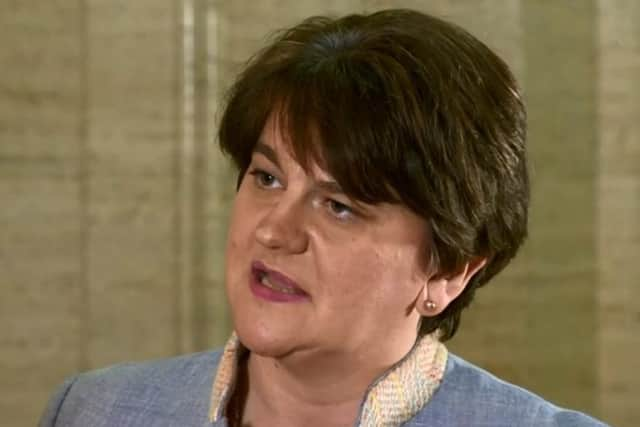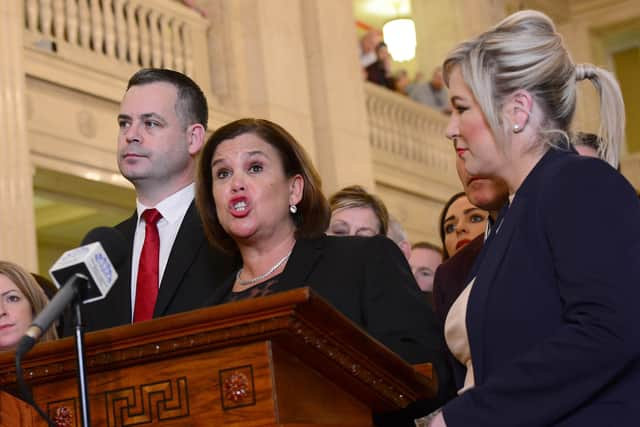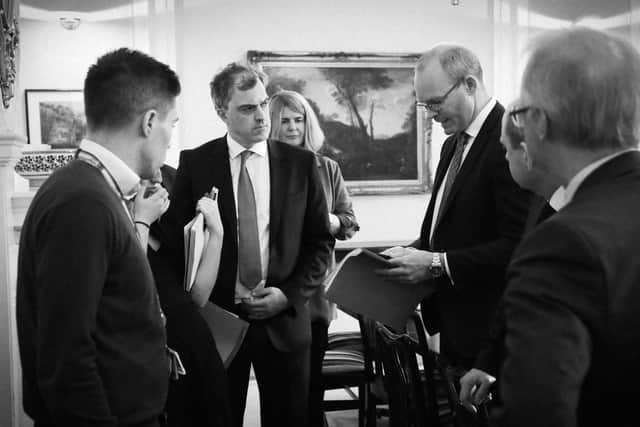Stormont back as DUP and Sinn Fein climb down


Sinn Féin yesterday accepted a deal which involves it abandoning its “red line” of not going back into Stormont with Arlene Foster while she is still awaiting the outcome of the RHI Inquiry.
The party (deputy leader Michelle O’Neill inset) also settled for what is a much tamer piece of Irish language legislation than that for which it had hoped.
Advertisement
Hide AdAdvertisement
Hide AdBut the DUP also firmly backed the proposals, despite them being strikingly similar to the February 2018 draft deal with the party rejected and containing Irish language legislation which Mrs Foster once told voters she would never accept.


The deal also involves the rapid implementation of the Stormont House legacy processes which former members of the RUC believe will be used to unfairly target them.
Yesterday the Orange Order, victims’ groups and the Police Federation expressed concerns about elements of the deal.
But Mrs Foster made clear that she would be pressing ahead with it, telling the BBC last night: “I believe it’s a very good deal in terms of the balance that has been achieved.”
Advertisement
Hide AdAdvertisement
Hide AdThe Assembly will reconvene at lunchtime today for an emergency sitting as the parties’ rush to implement a deal which was only published late on Thursday night.


The SDLP said that it would return to the Executive. However it is not yet clear whether the UUP or Alliance will do so.
The huge deal and proposed legislation comes to more than 30,000 words. It contains no mention of abortion – something some DUP members wanted addressed in the agreement.
And there is no mechanism to prevent a party collapsing the Executive and preventing the restoration of devolution until they are happy with what they are offered, as has happened after Sinn Féin walked out of Stormont in January 2017.
Advertisement
Hide AdAdvertisement
Hide AdThe deal sets out a host of significant policies, some of them in areas which had not been thought to be part of the talks:


l All “widely used” public websites will have to be available in Irish and public sector information and forms will have to be available in Irish “where required”.
l The 1737 ban on Irish in court will be repealed, it will be made possible to register births, marriages and deaths in Irish, and wills will be able to be made in Irish.
l Additional money will be found for Ulster Scots and Irish language broadcast funds, as well as the creation of Irish and Ulster Scots commissioners.
Advertisement
Hide AdAdvertisement
Hide Adl MLAs will be allowed to speak entirely in Irish or Ulster Scots and there will be on-hand simultaneous translation – presumably through headsets, as in the European Parliament – for MLAs who do not speak the language.
l There will be UK-wide legislation to further incorporate the Armed Forces Covenant into law and support full implementation of the Armed Forces Covenant and a Northern Ireland Veterans’ Commissioner.
l Stormont will create a “Culture and Community fund” to give money to “various groups in the expression of culture, arts and heritage and community halls and bands”.
l There will be three extra designated days on which the Union Flag will fly from public buildings.
Advertisement
Hide AdAdvertisement
Hide Adl An Ad-Hoc Assembly Committee and a panel of five experts will be established to consider “the creation of a Bill of Rights that is faithful to the stated intention of the 1998 Agreement in that it contains rights supplementary to those contained in the European Convention on Human Rights...and that reflect the particular circumstances of Northern Ireland”.
l There will be unspecified “strengthening” of “the rules and awareness around whistleblowing” and the insertion of three independent lay members on the Assembly Committee on Standards and Privileges, which investigates complaints against MLAs.
l A change to the Civil Service Code to state explicitly that officials should be present at all ministerial meetings and keep a record of discussions, with details of meetings published.
l A review of funding for opposition parties, but no guarantee as to what funding they will receive. l The creation of a ‘compact advisory panel’ to advise the Executive.
Advertisement
Hide AdAdvertisement
Hide AdThere are also a series of pledges as to what the new Executive will do. It promises no-one waiting over a year at September 30, 2019 for outpatient or inpatient assessment or treatment will still be on a waiting list by March 2021.
The new executive is also committed to creating a Gender Strategy, Sexual Orientation Strategy, Irish Language Strategy and an Ulster Scots Strategy.
There are no proposals to cut the number – or the salaries of up to £92,000 a year – of Stormont’s small army of special advisers (spads).
The deal also hints at quite significant educational reform, saying that the current multi-sector education system in Northern Ireland “is not sustainable” and there needs to be “sharing,cooperation and integration”.
Advertisement
Hide AdAdvertisement
Hide AdAnd there is agreement to implement major health reforms which will see unpopular decisions such as smaller local hospitals being downgraded or closed in favour of centres of excellence, something which medical experts agree improves health outcomes.
However, much of the immediate focus will be on the issue which for almost three years has been at the heart of the dispute between the DUP and Sinn Féin – the Irish language act.
The deal will see legislation to create a commissioner to “recognise, support, protect and enhance the development of the Irish language...and to provide official recognition of the status of the Irish Language”.
That will sit alongside an Ulster Scots commissioner ”to enhance and develop the language, arts and literature associated with the Ulster Scots/Ulster British tradition and to provide official recognition of the status of the Ulster Scots language”.
Advertisement
Hide AdAdvertisement
Hide AdThe legislation will also place a legal duty on the Department of Education to “encourage and facilitate the use of Ulster Scots in the education system”.
Speaking in Stormont’s Great Hall, Sinn Féin leader Mary Lou McDonald said: “We now have the basis to restore powersharing, and we’re up for that”.
Ms McDonald responded to Irish language activists disappointed with the weak legislation. She insisted it was only a start, predicting that more gains for language would come in the future.
“I would say to Irish language activists take heart from the fact that this is now a historic moment because for the first time we have official recognition,” she said.